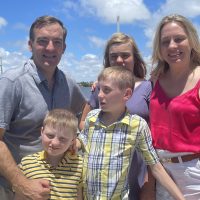Can’t I Just Plug Autism into my GPS?

By: Jennifer Sando
I’m so happy to be invited back this year to be DIG’s guest blogger for Autism Acceptance Month. As a reminder, I am the proud parent of two teens and one 10-year-old, all on the autism spectrum. My oldest was diagnosed with autism more than 14 years ago. One would think I would have this autism parenting thing down, but I don’t. I still have no idea what I’m doing most of the time. I have grappled with doubts about my actions and decisions from the early days of diagnosis until today.
Now, as a somewhat “experienced” autism parent, I often find myself receiving calls from parents of newly diagnosed children. Typically, it’s a friend of a friend struggling with the next steps following diagnosis. I’ll recommend therapists, schools, and suggest they contact University of Miami CARD. These parents also want to know about my kids and how I helped them develop skills. I share what has seemed to work for my children, but in all honesty, I’m not entirely sure what truly made the difference. I tell these parents that my child learned to say, “Hi” at a particular age while they were doing particular therapies. Though I can’t say with certainty which therapy developed that skill. Now with adolescents, I find myself grappling with the next phase of life: independence, adulthood, sexuality (help me!) and employment. This adult part seems especially critical to get correct. I’m presented with new challenges every time I feel like I have this autism thing figured out.
I felt lost back in 2008. That’s when my oldest child was diagnosed with autism. I, too, feverishly cold-called any parent who I heard had a child on the spectrum. I asked these parents where my daughter should go to therapy, where she should go to school. I asked if my daughter would learn to talk, if she would live independently, if she would be happy. I was asking for certainty. I wonder if these “experienced” parents felt as I do now, that though further along on the autism journey, that they had no idea what they were doing.
A few years ago, my husband took me to see the musical “Dear Evan Hansen.” Tears welled up as I really felt for the character of Evan Hansen’s Mom. In an early scene, after speaking with her troubled teen, she sings, “Anybody got a map?” The chorus went:
“Does anybody have a map?
Anybody maybe happen to know how the hell to do this?
I don’t know if you can tell
But this is me just pretending to know
So where’s the map?
I need a clue
‘Cause the scary truth is
I’m flying blind
And I’m making this up as I go”
At that moment, she was me. I completely understood this character. She was seeking out a map, a guide, some sort of certainty. Like the mother in the musical, I was flying blind, making it up as I go, wishing for a non-existent map.
The point of the song was that there is no certainty for any parent. Every child is different. The future is unpredictable. There was no map, no recipe, no way to plug this into my GPS.
I eventually found some direction in the most unlikely of places. It was while attending a professional happy hour at a local bar in the mid-2010’s. There, sipping on half-priced well-drinks, I found myself in conversation with a couple who had a teenager on the spectrum. I asked them if they had any advice for me when it came to raising my ASD kids. They said, “Just love them.” Genius, I swear! Though a simple statement, it was a revelation for me.
There it was, three words that I would cleave onto until today. I now use “just love them” as my guide. Whenever doubts cloud my mind, I remind myself that loving my children is the most important thing. I can be certain of that.
Along with “just love them,” I’ve discovered a few other self-guiding principles. I’ve learned the importance of not exhausting oneself. It’s tempting to run yourself ragged, getting your children to therapy after therapy, convincing yourself that every therapy is “crucial” or driving a great distance to find the “perfect” school. “Perfect” doesn’t exist and every therapy is not “crucial.” I’ve learned that while seeking good therapies and good schools is desirable, it is more important to focus on peace within the family, to give my children a safe home base where they can comfortably be themselves.
It is true that uncertainty has often prevailed in my complicated journey of autism parenting. Yet, amongst the chaos of therapies, schools and the challenges of adolescence, love remains paramount. So while I may still feel like I’m “flying blind and making this up as I go,” I will use love as a compass to navigate the future.













